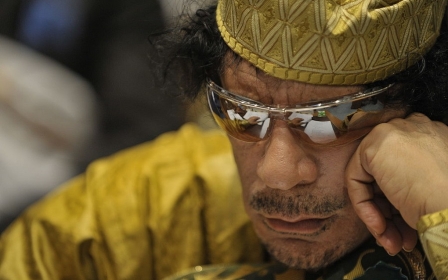Libya: Saif al-Islam Gaddafi to run for president

Saif al-Islam Gaddafi, son of the late Libyan ruler Muammar Gaddafi, registered on Sunday to run in the country’s presidential polls next month, the electoral commission said.
The 49-year-old, who is wanted for crimes against humanity by the International Criminal Court, appeared in an electoral commission video in traditional brown robe and turban, and with a grey beard and glasses, signing documents at the election centre in the southern town of Sebha.
“Saif al-Islam Gaddafi submitted… his candidacy for the presidential election to the High National Electoral Commission office in the city of Sebha,” said a statement by the commission.
Gaddafi had completed "all the required legal conditions", the statement read, adding that he was issued with a voter registration card for the Sebha district.
Stay informed with MEE's newsletters
Sign up to get the latest alerts, insights and analysis, starting with Turkey Unpacked
Libya's first ever direct presidential poll, with a first round on 24 December, is the climax of a process launched last year by the United Nations to draw a line under years of violence since the revolt that toppled dictator Muammar Gaddafi in 2011.
Libya opened registration for candidates on Monday.
Gaddafi is one of the most prominent - and controversial - figures expected to run for president, a list that also includes eastern military commander Khalifa Haftar, Prime Minister Abdulhamid al-Dbeibah and parliament speaker Aguila Saleh.
However, while his name is one of the best known in Libya, and though he once played a major role in shaping policy before the 2011 Nato-backed uprising that destroyed his family's regime, he has barely been seen for a decade.
In June, sources close to Saif al-Islam said he was planning a political comeback. In July, he told the New York Times in an interview that he wanted to "restore the lost unity" of Libya after a decade of chaos and did not exclude standing for the presidency.
Until the interview, Saif al-Islam had not been seen or heard from since June 2014, when he appeared via video link from Zintan, in the west of the country, during his trial by a Tripoli court.
His father was overthrown and killed in 2011 in a Nato-backed uprising that has left the country in a state of upheaval ever since.
During the uprising, Saif al-Islam became for many the face of the government's defiance, regularly denouncing the opposition as "terrorists" and promising that his father's administration would "fight to the last minute, until the last bullet".
After years of fighting between rival camps following Muammar Gaddafi's overthrow, a formal truce was signed last October between military commander Khalifa Haftar and forces loyal to the internationally recognised administration in Tripoli. This led, eventually, to the creation in March of an interim government.
Forces loyal to Haftar, a former Gaddafi ally turned defector, are reportedly keen to prevent Saif al-Islam's return to the political scene. According to pro-Gaddafi outlets, Haftar’s son Saddam - who is also considering a presidential run - sought to have him killed recently.
While Gaddafi is likely to play on nostalgia for the era before the 2011 uprising, analysts told Reuters that he may not prove to be a frontrunner.
The Gaddafi era is still remembered by many Libyans as one of harsh autocracy, while Saif al-Islam and other former regime figures have been out of power for so long they may find it difficult to mobilise as much support as major rivals, they added.
Middle East Eye delivers independent and unrivalled coverage and analysis of the Middle East, North Africa and beyond. To learn more about republishing this content and the associated fees, please fill out this form. More about MEE can be found here.





